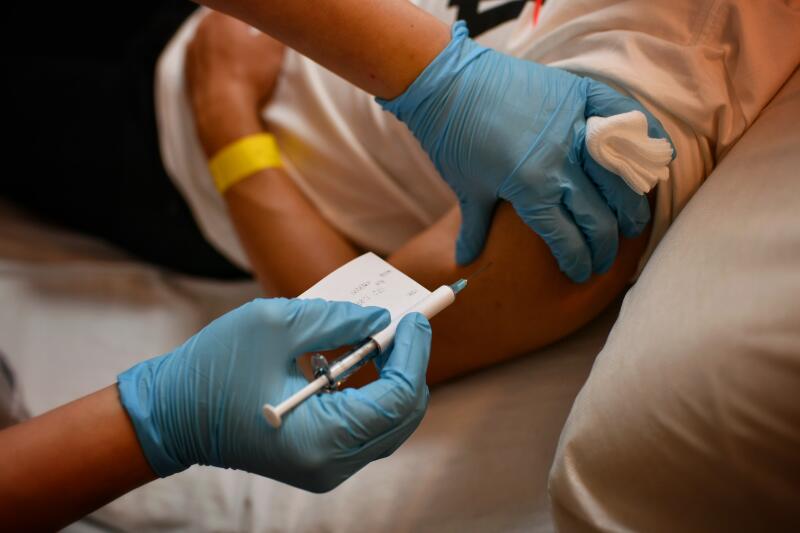Singapore's first phase 3 antibody trial ready to enrol Covid-19 patients
Sign up now: Get ST's newsletters delivered to your inbox

Singapore is only the third country to start recruiting patients as part of a global antibody trial called Activ-3.
ST PHOTO: CHONG JUN LIANG
Follow topic:
SINGAPORE - Hospitalised Covid-19 patients here will now have a new treatment option: to take part in Singapore's first phase three monoclonal antibody trial.
The National Centre for Infectious Diseases (NCID) said that it is ready to enrol its first patients as of Tuesday (Oct 6) - though none had been recruited as at Thursday afternoon - and aims to enrol a total of 100 local patients.
Singapore is only the third country to start recruiting patients as part of a global trial called Activ-3, which started in August and aims to recruit 1,000 patients globally. As at Thursday, 260 patients were recruited in the global trial, most of them from Denmark and the United States.
Activ-3 is estimated to be completed by year's end or in January 2021 - so Singapore's contribution will depend on how long it takes for the trial to recruit the study number and how many patients are eligible for the trial here, The Straits Times was told on Thursday by Associate Professor David Lye, senior consultant and director of the Infectious Disease Research and Training Office in NCID.
The monoclonal antibody was developed by American pharmaceutical company Eli Lilly.
It is a purified, highly active antibody that targets the spike protein of the coronavirus.
Activ-3 enrols Covid-19 patients who are sick enough to be hospitalised.
Patients who provide informed consent will be randomly allocated to one of two study arms: monoclonal antibody or placebo. This means that patients will get either the antibody or a placebo, and both groups will also be given the antiviral drug remdesivir.
Patients may also be given the steroid dexamethasone - a drug which broadly suppresses the body's immune response and can be used to treat severe asthma and severe allergic reactions - if the doctor deems it suitable.
In Singapore, NCID will be enrolling patients with pneumonia or high-risk patients older than 45, with chronic health problems such as diabetes or high blood pressure. Healthy individuals will not be included in the trial.
Local patients in the Activ-3 trial will be monitored for 90 days and seen daily for the first five days. This is to observe possible side effects and determine how they are responding to treatment.
Currently, only one antibody is investigated in the trial. However, new monoclonal antibodies - selected by a National Institutes of Health review committee - may be studied to see if they could be potentially effective.
Presently, the review committee is actively considering two to three other monoclonal antibodies, Prof Lye said. This means that Activ-3 may continue until enough effective monoclonal antibodies have been found.
ST had reported on Tuesday that one of the two monoclonal antibodies in the cocktail used to treat US President Donald Trump for Covid-19 was developed using blood samples from three patients in Singapore. NCID has clarified that Activ-3 has no connection to that treatment cocktail, which was developed by US biotech firm Regeneron.
These monoclonal antibodies are only accessible through trials which will determine if they are both safe and effective. They are not part of approved treatments.
This is why Singapore is keen to be part of this trial, so that if there are more serious cases of local Covid-19 infection, they can be treated, Prof Lye explained.
Activ-3 is one of the few treatment trials in which Singapore has participated.
Previously, the NCID - in partnership with the National Institutes of Health - took part in three adaptive Covid-19 treatment trials (ACTT) for three different drugs.
The first trial, also known as ACTT1, recruited 1,062 patients globally, with Singapore contributing 16 patients. It has now been completed.
ACTT1 proved that the antiviral drug remdesivir is effective in improving recovery time and reducing mortality in patients with low oxygen flow. The Health Sciences Authority has granted conditional approval to infectious disease specialists giving remdesivir to seriously ill Covid-19 patients.
Antibody therapy works in a different way compared to antiviral drugs like remdesivir. Remdesivir gets inside the cell and blocks the virus from reproducing while antibodies bind to the virus and stop it from entering the cell.
The second trial, or ACTT2, has recruited 1,033 patients globally, with Singapore contributing 44 patients.
ACTT2 studied whether baricitinib, a drug to treat rheumatoid arthritis, would be effective in treating Covid-19. The full results are due to be out in a month's time.
The third trial, or ACTT3, is currently ongoing and studies if beta interferon - a drug used to treat multiple sclerosis - would be effective in treating Covid-19.
As at Thursday, ACTT3 has recruited 488 patients globally, with Singapore contributing four patients, given the low number of active cases in the country.
ACTT trials take place in four sites in Singapore: the NCID, National University Hospital, Changi General Hospital and Ng Teng Fong General Hospital.

